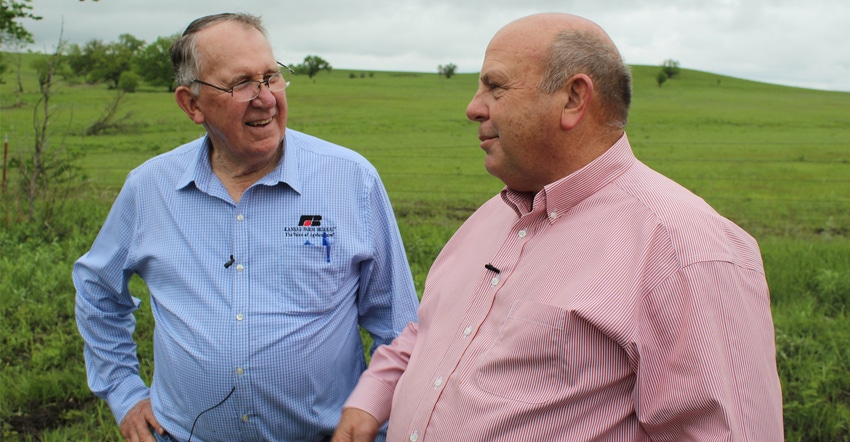
Environmental stewardship is the hot topic of Washington, D.C., these days. But if you look around, it’s more than a hot topic of debate for farmers and ranchers — it’s their livelihoods, and the American Farm Bureau Federation’s members are leading the conversation, says AFBF President Zippy Duvall.
Duvall spoke to reporters on a May 19 visit to the ranch of Kevin Gant, near Council Grove, Kan.. He was there on a listening tour, part of a return to in-person events with members to hear what is on the top of their minds.
Environment
Duvall said his horseback ride through the Flint Hills with Kansas Farm Bureau President Rich Felts reinforced that farmers need to lead the environmental conversation and make sure that programs are incentive-based.
“We’ve proven it over and over again, through the programs at USDA and in conservation, that if you put the incentive out there, our farmers are willing to spend their money to do their part to bring conservation to their ways,” Duvall said.
Felts said Kansas members want to make sure that whatever is decided in Washington, there should be a way to not penalize those farmers who’ve been doing conservation work for years.
“I think one of the contentious things is, we’ve had a lot of people that have done a lot already in terms of conservation,” Felts said. “We’ve done a lot of no-till farming on the crop side, but we have to determine, what is the baseline?”
Infrastructure
Duvall says prioritizing immediate infrastructure needs is key to getting any package passed with bipartisan support. And U.S. farmers and ranchers need a modern infrastructure to stay competitive in the global marketplace.
“Infrastructure is the only thing that sets us apart in agriculture from the rest of the world,” he said. “We have got to make sure that we maintain and improve our infrastructure, and not just stop at roads and bridges and dams and levees. We also got to make sure that we get broadband across this country, and close that divide.”
Felts said Kansas members agree, and the pandemic brought the need for a robust broadband into stark clarity — for education, health care and business needs.
“We’ve just got to keep up and realize that the economy doesn’t just revolve around our big communities,” Felts sad. “We’ve got to have broadband to some of our more remote areas as well. The technology is there [in farming]; we have to be able to utilize it, and broadband is the connecting link.”
Duvall also said that public research and development dollars need to be part of infrastructure packages, because our public research is what has kept American agriculture on the cutting edge. However, Duvall said members must realize that priorities must be set in order to get any bill passed. Holding out for every item on President Joe Biden’s American Jobs Plan may possibly dilute the bipartisan support of the package — and thus jeopardize any passage of any package at all.
“Infrastructure to me is more of roads and bridges and dams and broadband,” he said. “But once you start getting outside that realm, you’re gonna dilute the bipartisan support of it. And we need to do this infrastructure piece, and then we need to approach the other problems that we see that prevent people from moving back to our rural areas.” That means topics like addressing the rural child care gap may have to wait.
Labor and immigration
Labor is another hot button issue for Farm Bureau members, and Duvall said it’s the biggest limiting factor to American agriculture. He said he hears from members who want to bring the next generation back to the family farm and expand, but they can’t do so because there is a limited labor supply.
“On the other hand, we have people here — some come here illegally — to try to supply their family with a way of life, and we won’t go ahead and face a problem and fix it,” Duvall said. “The politics gets in the way of fixing that. And we need a guest worker program that we can bring people here, that is affordable to our farmers and is year-round, because there is so much more than just seasonal agriculture.” For example, he added, the cap on year-round workers is 20,000, and there is an estimated 100,000 jobs that are waiting to be filled just in the dairy industry right now.
“So, if you’re going to create a bill to help solve a problem, why do you all stop short of solving it?” Duvall asked.
Taxes
Farm Bureau members are concerned with how the country will pay for the programs that are being put forth in Washington, Duvall said. Proposing to do away with stepped-up basis on capital gains, an idea that is being floated, will be the death of the family farm, he said.
“We are not rich people,” Duvall said. “We may be rich in land, but we are poor in cash. And when the taxes come due, the only way to get the case is to sell the land — and so then you can’t pass it on to your children.” Without family farmers on the land, Duvall added, we chance destroying the national security that is based on the food security that farmers ensure in this country.
About the Author(s)
You May Also Like






